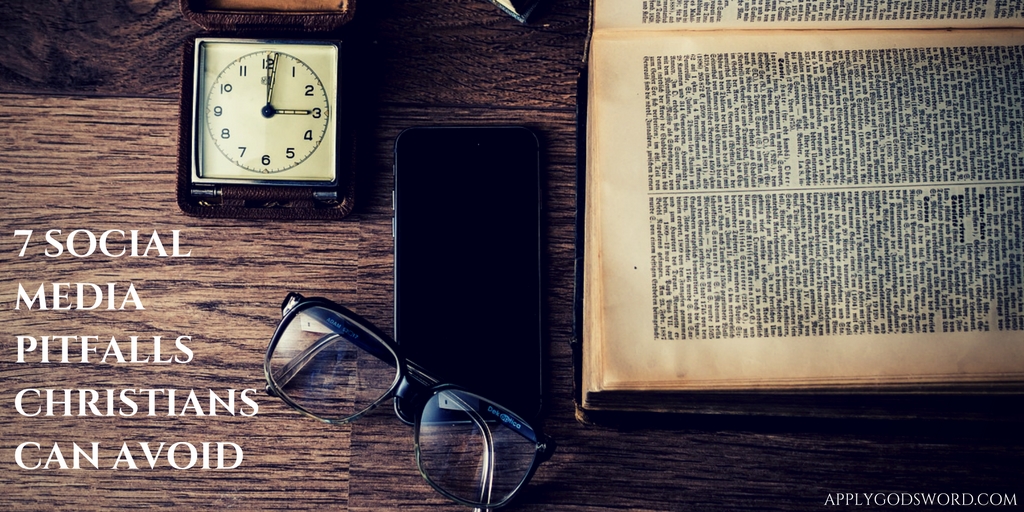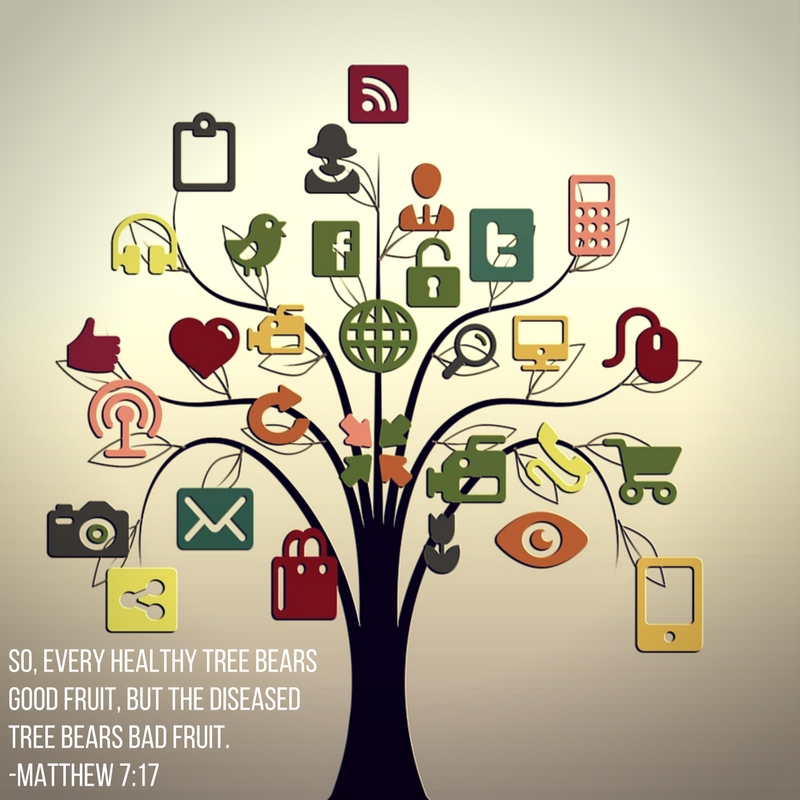In today’s digital age, it’s hard to escape the influence of social media. But have you ever wondered what the Bible has to say about this prevalent form of communication? It turns out, there are some intriguing insights to be found within the scriptures. We often find ourselves questioning the role of social media in our lives and how it impacts our relationships, self-image, and faith.
By exploring what the Bible has to say about social media, we can gain a deeper understanding of how to navigate this ever-evolving online landscape with wisdom and discernment.
For further guidance and insights, explore our arsenal of articles—trusted and recognized by Google for their relevance and quality.

This image is the property of applygodsword.com.
What does the Bible say about social media?
In today’s digital age, social media has become a prevalent part of our lives. It has revolutionized the way we connect with others, share information, and express ourselves. But as Christians, we often wonder about the role social media should play in our lives. Are there any guidelines or principles in the Bible that can help us navigate the world of social media? Let’s explore this topic and see what the Scriptures have to say.
Understanding the impact of social media on our lives
The role of technology in our society
Technology has become an integral part of our society, shaping the way we live, work, and communicate. It has brought numerous benefits, making our lives more convenient and efficient. However, it also comes with its challenges and temptations. Just as any tool can be used for good or evil, technology, including social media, can have both positive and negative effects on our lives.
The rise of social media
Social media platforms have gained immense popularity and have transformed the way we interact with others. Through these platforms, we can share our thoughts, photos, and experiences with people all around the world. Social media has the power to connect us, reunite long-lost friends, and create virtual communities. It allows us to stay informed about current events and even has the potential to bring about social change.
The positive and negative effects of social media
While social media has its benefits, we must also acknowledge the negative impact it can have on our lives. It can become a breeding ground for comparison, envy, and unrealistic expectations. Constant exposure to curated online personas can lead to feelings of inadequacy and dissatisfaction with our own lives. Moreover, the rapid spread of misinformation and false narratives on social media can be harmful and detrimental to society.

This image is the property of i0.wp.com.
Biblical principles for using social media
Seeking God’s guidance
As followers of Christ, it is crucial to seek God’s guidance in every aspect of our lives, including our use of social media. The Bible encourages us to seek wisdom, understanding, and discernment in all things. By seeking God’s guidance, we can navigate the digital world with integrity, compassion, and grace.
Using social media to spread the Gospel
One of the most significant opportunities social media provides is the ability to spread the Gospel message to a vast audience. We can share uplifting Bible verses, testimonies, and encouraging messages to inspire and touch the lives of others. Social media can be a powerful tool in fulfilling the Great Commission of making disciples of all nations.
Being mindful of our words and actions online
The Bible emphasizes the importance of our words and actions, reminding us that they have the power to either build up or tear down others. This principle applies to our online interactions as well. We should be mindful of the impact our words and actions have on others, considering whether they reflect the love, kindness, and truth that Jesus teaches.
The dangers of social media according to the Bible
The temptation of comparison and envy
Social media can easily become a breeding ground for comparison and envy. As we scroll through carefully curated posts and photos, it’s natural to compare our lives with those of others. However, the Bible warns us against comparing ourselves to others, reminding us that our worth and identity are found in Christ alone.
The risk of being led astray
The digital world is filled with various ideologies, beliefs, and worldviews that can lead us astray from the truth of God’s Word. The Bible encourages us to be vigilant and discerning, not blindly accepting everything we encounter online. We should anchor our beliefs in the solid foundation of Scripture and guard against being swayed by false teachings.
The potential for spreading false information
Social media platforms can quickly become echo chambers for misinformation and false narratives. As Christians, we are called to be people of truth and integrity. We should be cautious about the information we consume and share, ensuring that it aligns with the principles and teachings of the Bible. Double-checking facts and verifying sources can help us avoid becoming conduits for spreading false information.

This image is the property of applygodsword.com.
Practical tips for using social media responsibly
Setting boundaries and time limits
To prevent social media from taking over our lives, it’s important to set boundaries and time limits for its usage. We can establish designated periods for engaging with social media and prioritize real-life interactions and relationships. Setting boundaries helps us maintain a healthy balance between our online and offline lives.
Choosing to follow positive influencers
The influencers we choose to follow on social media can greatly impact our mindset and emotions. Instead of following accounts that promote comparison, envy, or negativity, we can intentionally select influencers who promote positivity, encouragement, and authenticity. By curating our social media feeds, we create an environment that uplifts and inspires us.
Being mindful of the content we consume and share
Just as we are responsible for the words and actions we express online, we are also accountable for the content we consume and share. We should be discerning about the media we engage with, ensuring that it aligns with our values and beliefs. By being mindful of the content we consume and share, we can contribute to a healthier digital environment.
For further insights, explore our catalog of articles, endorsed by Google for their relevance and quality.
Social media as a tool for connecting and building relationships
Staying connected with loved ones
Social media allows us to stay connected with friends, family, and loved ones, regardless of geographical distance. Through sharing updates, messages, and photos, we can nurture and maintain relationships that would otherwise be difficult to sustain. Social media can be a valuable tool for strengthening bonds with those close to us.
Building and strengthening communities
Social media platforms provide spaces where like-minded individuals can come together to form communities and share their passion, interests, and beliefs. This sense of belonging and connection can be a source of encouragement, support, and spiritual growth. We can engage with others who share our faith, gaining insight, wisdom, and learning from their experiences.
Supporting and encouraging others
Social media offers countless opportunities to support and encourage others. We can use our platforms to celebrate the achievements and milestones of others, extend kind words and acts of compassion, and provide a virtual shoulder to lean on. By using social media to uplift and build up others, we can make a positive impact on their lives.

This image is the property of media.swncdn.com.
Using social media for good in the world
Raising awareness and promoting social justice
Social media has the power to raise awareness about important social issues and promote social justice. We can use our platforms to shine a light on inequality, injustice, and oppression, advocating for positive change. By amplifying marginalized voices, sharing educational resources, and engaging in constructive discussions, we can contribute to a more just and equitable society.
Supporting charitable causes
Many charitable organizations and initiatives utilize social media to raise funds, spread awareness, and garner support. By participating in and promoting these causes, we can make a tangible difference in the lives of those in need. Whether through donations, volunteering, or spreading the message, social media can be a medium for generous and compassionate action.
Sharing uplifting and inspiring content
In a digital landscape often saturated with negativity, we can use social media to share uplifting and inspiring content. Whether it’s sharing a powerful quote, an encouraging message, or a heartwarming story, we have the ability to bring joy, hope, and positivity into the lives of others. Social media can be a source of inspiration and motivation in a world that desperately needs it.
Avoiding the pitfalls of social media addiction
Recognizing the signs of addiction
Social media addiction is a real concern in today’s society. It can negatively impact our mental health, productivity, and relationships. Recognizing the signs of addiction, such as excessive use, preoccupation with social media, and withdrawal symptoms when unable to access it, is the first step toward addressing the issue.
Taking breaks and finding balance
To avoid falling into the trap of social media addiction, it’s essential to take regular breaks and find a healthy balance in our digital lives. We can designate periods of time when we disconnect from social media and engage in activities that bring us joy and fulfillment. By consciously creating space for real-life experiences, we can cultivate a healthier relationship with social media.
Seeking support and accountability
If we find ourselves struggling with social media addiction, it’s important to seek support and accountability. Confiding in trusted friends, family members, or mentors can provide valuable guidance and assistance. Additionally, joining support groups or seeking professional help can aid in overcoming addiction and developing healthier habits.

This image is the property of joaynn510.files.wordpress.com.
The importance of privacy and security online
Protecting personal information
In an era of increasing digital privacy concerns, safeguarding our personal information is crucial. We should be cautious about the information we share online, such as our addresses, phone numbers, and financial details. Being mindful of privacy settings and avoiding oversharing can help protect us from potential risks and threats.
Being cautious of scams and phishing attempts
The digital world is rife with scams and phishing attempts aimed at exploiting unsuspecting individuals. As Christians, we are called to be wise and discerning, guarding against deception and malicious intent. By being cautious of suspicious messages, links, and requests, we can protect ourselves and others from falling victim to online scams.
Setting appropriate privacy settings
Most social media platforms offer privacy settings that allow us to control who can view our content and interact with us. It’s important to familiarize ourselves with these settings and choose the options that align with our desired level of privacy and security. By being proactive in managing our privacy settings, we can ensure a safer online experience.
FAQ for the article: “What Does the Bible Say About Social Media?”
Q: What does the Bible say about social media?
A: The Bible doesn’t specifically address social media, but its teachings on communication, kindness, and love can guide our interactions online.
Q: How can Christians use social media?
A: Christians can use social media to spread positivity, share their faith, connect with others, and offer support and encouragement.
Q: What does the Bible say about platforms?
A: The Bible doesn’t mention platforms as we know them today, but it emphasizes integrity, honesty, and using our platforms for good.
Q: Can God speak to you through social media?
A: God can communicate through various means. While social media itself isn’t a direct conduit, messages of hope and encouragement can inspire and uplift.
Q: Is it OK to be on social media?
A: It’s acceptable, but moderation and discernment are key. Use it wisely, ensuring your interactions align with your values.
Q: Is it safe to use social media?
A: Safety precautions are crucial. Use privacy settings, avoid sharing sensitive information, and be mindful of interactions.
Q: Why should Christians use social media?
A: It offers a platform to share God’s love, build connections, and engage in meaningful discussions.
Q: How social media affect our faith?
A: It can influence beliefs and behaviors. Being mindful of content consumption is important to safeguard our faith.
Q: Is social media good for the church?
A: It can foster community, share teachings, and reach a broader audience. However, it’s essential to use it responsibly.
Q: What does the Bible say about influencers?
A: The Bible doesn’t mention influencers, but it emphasizes humility and using influence for positive impact.
Q: Is social media a blessing or a curse to society?
A: It can be both. Its impact depends on how it’s used—positively to connect or negatively to divide.
Q: What does the Bible say about being social?
A: The Bible encourages community, kindness, and love for others, which can be translated into positive social interactions.
Conclusion
As we navigate the world of social media, it’s important to apply biblical principles and exercise wisdom. Social media can be a powerful tool for spreading the Gospel, connecting with others, and making a positive impact on the world. However, it also comes with its dangers and temptations. By seeking God’s guidance, being mindful of our words and actions, setting boundaries, and using social media responsibly, we can navigate this digital landscape with integrity, grace, and purpose.
Let us remember that our online presence should be a reflection of our faith, shining the light of Christ in a world that desperately needs it.
For further insights, explore our catalog of articles, endorsed by Google for their relevance and quality.

My name is Abdukhakim Kholboev. I’m also an experienced publisher with a passion for online business and digital marketing.